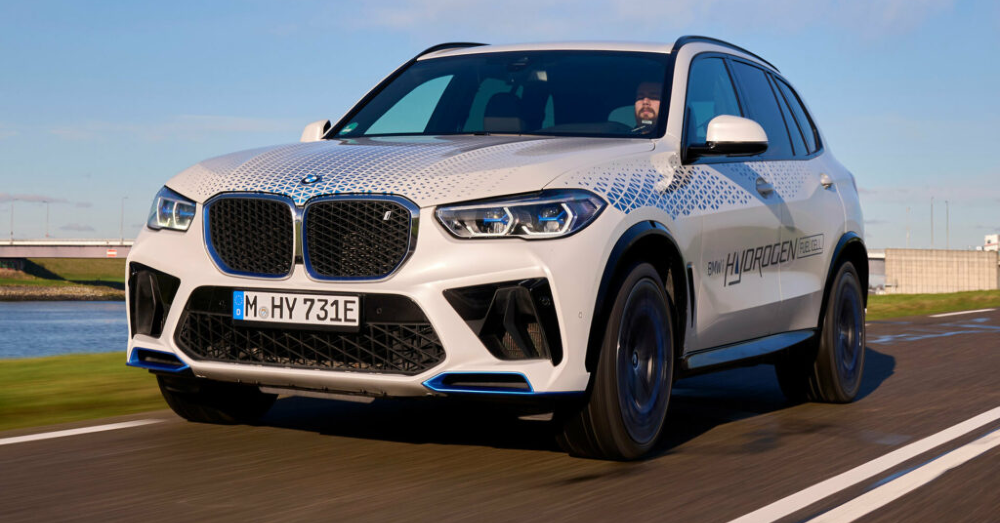Hydrogen fuel cell vehicles (FCVs) could be the next great thing in the automotive industry. These vehicles run on hydrogen and expel only water vapor.
Many automakers have experimented with FCVs but have spent more time and effort developing electric vehicles. FCVs could have an advantage over EVs because refueling them requires the same timeframe and system as putting gasoline or diesel into an ICE vehicle. We could see FCVs become more popular and offer excellent driving range between fill-ups. With that in mind, here are seven hydrogen fuel cell vehicles with up to 500 miles of driving range.
BMW iX5 – A hydrogen take on a traditional SUV
BMW has worked with limited-production FCVs since 2000, but we haven’t seen a widespread application of these vehicles yet. The first BMW hydrogen-powered vehicle is the 750hL, but the modern X5 includes a hydrogen fuel cell which changes the name to the iX5. This BMW SUV could be an impressive vehicle with the power desired to drive for up to 500 miles between fill-ups. When the infrastructure catches up, the BMW iX5 could be a huge hit.
Honda CR-V FCEV – Hydrogen powering the most popular Honda
This version of the CR-V will be more than just a hydrogen fuel cell vehicle. It will also be a battery-powered electric vehicle with power systems for both types of alternative fuel. This new CR-V will be made in Ohio and could offer owners the desired driving range and offer the benefits of going from one system to the other as needed. This new FCEV is a collaborative development between GM and Honda to create a new hydrogen system.
Hyundai Nexo – This Hyundai Is the one
The Hyundai Nexo is one of the most popular hydrogen fuel cell vehicles in existence. The new Nexo should arrive in 2025 and offer a driving range of nearly 500 miles when filled with hydrogen. The first version of this small SUV arrived in the market in 2018, and the new model will be much more than a cosmetic refresh of the vehicle. There will be two versions of the new Nexo offered, which have become popular in areas where hydrogen refueling stations are located.
Kia Carnival FCV – Family hauling with hydrogen power
The Kia Carnival arrived recently as an improvement over the previous Sedona minivan, and soon we should see this van offered with a hydrogen fuel cell power system giving this van the desired power for a great drive. Prior to offering the Carnival an FCV system, Kia will use these systems in its military vehicles and then transition to the system to the Carnival. It might not be too long before your family can refuel at a hydrogen station and feel good about producing only water vapor as the exhaust.
Land Rover Defender – Experimental FCV from Land Rover
While not an official vehicle yet, we could see the Land Rover Defender join the ranks of hydrogen fuel cell vehicles in the future. Land Rover is heavily invested in creating these new hydrogen-powered off-road SUVs for the future. The project is called “Zeus” and could be the future of driving on the trails without putting out any harmful emissions. Its possible this could be a great solution to the challenges of EVs because extra liquid hydrogen could be carried on the trails.
Toyota Hilux Hydrogen – The next evolution of the Hilux truck
Toyota is one of the most popular names in the world of FCVs. The Mirai is one of the most popular vehicles using this fuel, but it’s a small hatchback. The Hilux could be the next development and is one of the most useful and rugged trucks in the world. If the Hilux Hydrogen is a success, we could see the same hydrogen powertrain included in the Tacoma or Tundra trucks in the United States.
Kia FK/Hyundai FK – Can hydrogen be used in a sports car?
The Vision FK project is how Hyundai and Kia are working to apply hydrogen technology to a sports coupe. This car appears to be built to wear the Genesis name, but the Hyundai Group says it’s not meant to be in the luxury car lineup. This new FCV could be an alternative-fuel replacement for the Stinger, which is now gone from the market in favor of the EV6. Will a hydrogen powertrain be utilized for sports cars? This project makes it possible.
Will hydrogen fuel cell vehicles become widespread enough to require a much greater infrastructure in the near future? That question hasn’t been answered yet, but these seven vehicles could push the automotive industry in that direction.
This post may contain affiliate links. Meaning a commission is given should you decide to make a purchase through these links, at no cost to you. All products shown are researched and tested to give an accurate review for you.

